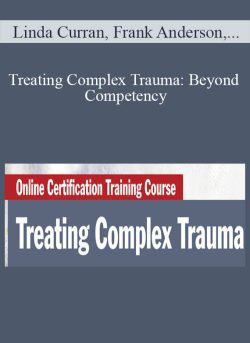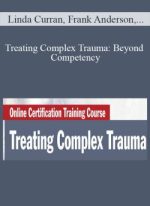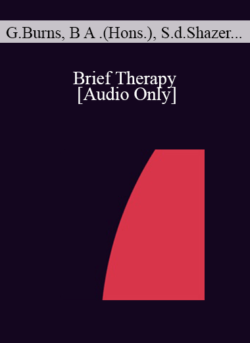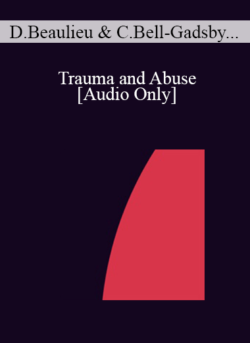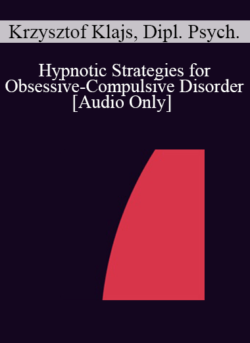Linda Curran, Frank Anderson, Edna Foa, and more! – Treating Complex Trauma: Beyond CompetencyIntensify and Expand Your Trauma Treatment CapabilitiesYou know that building the skills to treat trauma and complex PTSD takes ongoing dedication to the craft and science of therapy… Because trauma treatment is always evolving.That’s why I’ve interviewed world-renowned trauma experts and collected their insights and in-session demonstrations in this all new online certification training course…You’ll get insight into proven trauma processing modalities from the developers of these techniques. You’ll learn about:Internal Family Systems (IFS) Therapy from developer Dr. Richard Schwartz, and Dr. Frank Anderson, vice chair and director of the Foundation for Self LeadershipGestalt Therapy from David Henrich, who has studied for more than 30 years, and Dr. Mary Lou Schack, one of the founders of the Gestalt Therapy Institute of Philadelphia (GTIP)Eye Movement Desensitization and Reprocessing (EMDR) from Linda Curran, an expert in the fieldMindfulness-Based Stress Reduction from pioneering teacher and leader in the clinical application of mindfulness meditation Elana RosenbaumThe Adverse Childhood Experiences (ACE) Study from Dr. Vincent Felitti, co-principal investigator of the studyBrainspotting, from the developer of this internationally acclaimed method Dr. David GrandSomatic Experiencing from its developer Dr. Peter LevinePolyvagal Theory from the founder Dr. Stephen PorgesEmotionally Focused Couples and Family Therapy (EFT) from the founder Sue JohnsonCompassionate Inquiry for treating addiction, ADHD and more from developer Dr. Gabor MatéDialectical Behavior Therapy (DBT) from Dr. Lane Pederson, who also founded Dialectical Behavior Therapy National Certification and Accreditation Association (DBTNCAA), the first active organization to certify DBT providers and accredits DBT programsProlonged Exposure Therapy (PE) from its founder Dr. Edna FoaCognitive-Behavioral Therapy (CBT) from Dr. Donald Meichenbaum, one of its foundersDiscover what’s been done in the field of traumatic stress, new perspectives on the nature and experience of trauma, and gain a deeper understanding of trauma’s far-reaching psychological and physical consequences.The demonstrations showing these experts’ skills in action help speed the learning and application of their proven processes to your own practice…So you can adapt their experience to create theoretically sound principles that improve your clinical outcomes…And help your clients find lasting relief from the anger, nightmares, shame, anxiety, depression, and other debilitating symptoms of trauma and complex PTSD.Sincerely, Linda Curran, BCPC, LPC, CACD, CCDPDCOURSE OBJECTIVESFormulate how the mammalian arousal cycle and stress response informs current trauma treatment.Determine the basics of neurodevelopment in early stages of life and theorize how attachment deficits, left unaddressed, continue to impact adults throughout the lifespan.Employ two methods of grounding a dissociated client in session informed by the Polyvagal theory.Appraise the ACE study and apply its findings to clinical diagnosis and treatment of developmental and attachment trauma.Appraise the diagnostic criteria and clinical presentation of Complex PTSD.Role-play a compassionate approach to self-destructive behaviors with clients in-session.Assess the importance of setting firm boundaries in the therapeutic relationship as it relates to setting boundaries can improve treatment outcomes.Debate the current theoretical basis for addiction treatment (i.e. addiction is a choice or a disease) compared to the biopsychosocial theory of addiction.Perform three mindfulness practices; include any clinical modifications for use with a traumatized population.Propose how somatic interventions enable clients to extinguish conditioned responses to procedural memories.Develop an argument for AND against the use of medications with traumatized clients.Appraise Shapiro’s 8-Phase Model of EMDR. Define and defend the modifications made to the protocol when using EMDR with clients with complex trauma.Determine the development of “parts” (a component of IFS therapy) that result from trauma and how their function can be used as a resource for clients.Assess the theory and practice of Gestalt Therapy beyond the archetypal empty chair technique that can be incorporated into trauma treatment planning.And many more!COURSE MODULESPart 1Biological Nature of TraumaBiological nature of traumaTriune brainBrain/body integration: understanding the brain/body feedback loopMechanisms of traumaPrinciples informing state-of-the-art clinical interventionsTreatment implicationsPolyvagal Theory, with Stephen Porges, PhDLong-term memoryImplicit memoryExplicit memoryDSM-5 trauma diagnosesSingle-incident PTSDAcute Stress DisorderPTSD subtypesTrauma Sequelae: chronology of symptom clusters post-single incident PTSDTrauma symptoms characteristic of early childhood trauma, with Robert Scaer, MDAdverse Childhood Experiences, with Vincent Felitti, MDBackgroundLong-term impact on individualsCorrelation with addictionPublic health implicationsAttachment, with Dr. Bessel van der Kolk, Dr. Diane Poole Heller, and Dr. Dan SiegelNeurodevelopmentAttachment essentialsAttachment security and strategiesDevelopmental trauma disorderPart 2Definition of Trauma and Trauma ConditionsTrauma: working definitionConditions resulting from traumaPTSSingle incident PTSDComplex PTSDBorderline Personality DisorderBPDStigmaDSM criteriaDevelopmental/attachment traumaBPD and CPTSDParallelsDistinctionCPTSDDiagnosisDSM-5 and ICD-11 specificationsDistinct from PTSD (single incident)Maladaptive behaviorsFunction of addictions and self-injury in individuals with traumaTreatment principles and strategiesDissociation, with Robert Scaer, MDPTSD and CPTSD: “dissociative disorders”Correlation between childhood abuse and re-victimizationTreatment implicationsAddictionMythsNature of addictionTreatment implicationsTrauma and addiction, with Gabor Maté, MD12-step programs and the rehabilitation industryPart 3Stage Model of Trauma TherapyStage model of trauma therapyJanet’s tri-phasic model of trauma therapyDual awareness, with Babette Rothschild, MSW, LCSWHistory takingMindfulness and awareness practices, with Dr. Jim Hopper; Elana Rosenbaum, MS, LICSW; Belleruth Naparstek, LISW, BCD; and Amy Weintraub, MFA, ERYT-500MindfulnessMindfulness-based stress reduction (MSBR)Program breakdownIn-session body scan demonstrationGuided imageryMindfulness/bodyfulnessYogaPacing yoga practice for traumatized populationEffects of trauma on musculoskeletal systemUse of yoga mudras for self-soothingIn-session with Amy WeintraubDialectical behavioral therapy with Lane Pederson, PsyD, LP, DBTCDiscussionTheory and developmentSystematic implicationDBT skills training and toolsIn-session with Lane PedersonTrauma and medication with Frank Anderson, MDThe importance of client agencyEmploying IFS when prescribing medicationsSomatic experiencing with Peter Levine, PhDIn-session with Peter LevineTheory and practiceSomatic Therapy with Babette Rothschild, MSW, LCSWIn-session with Babette RothschildPart 4Trauma Processing ModalitiesCognitive behavioral therapy with Donald Meichenbaum, PhDProlonged exposure therapy with Edna Foa, PhDTheory developmentApplicabilitySensorimotor psychotherapy with Janina Fisher, PhDPsychoeducation in trauma therapy – utilizing cognitive overrideResourcing clientsBody-oriented and somatic interventionsEye-movement desensitization and reprocessing (EMDR)Theory with field leadersShapiros 8-phase modelClinical modifications for complex traumaIn-session with Linda CurranInternal family systems with Richard Schwartz, PhDTheory and applicabilityIn-session with Frank AndersonTheory development and practiceIn-session with Richard SchwartzGestalt therapyBeyond the empty chair techniqueVerbal narrative vs. body narrativeIn-session with Mary Lou Schack, PhDIn-session with David Henrich, LCSW, BCDMEET YOUR EXPERTSLinda Curran, BCPC, LPC, CACD, CCDPD, is president of Integrative Trauma Treatment, LLC, in Havertown, PA. She provides clients an integrative approach to trauma, and treats PTSD in adolescent and adult populations, including clients with eating disorders, sexual trauma, and self-injury. An international speaker on the treatment of trauma, Linda has developed, produced, and presents multi-media workshops on all aspects of psychological trauma.Linda is the author of the best-selling Trauma Competency: A Clinician’s Guide (PESI, 2010) and 101 Trauma-Informed Interventions: Activities, Exercises and Assignments to Move the Client and Therapy Forward (PESI, 2013). She is the producer of the best-selling Interview Trauma DVD series in which she collaborated with the world’s leaders in trauma: Bessel van der Kolk, MD; Peter Levine, PhD; Babette Rothschild, MSW, LCSW; Stephen Porges, PhD; Janina Fisher, PhD; and many more. Click here for information about Linda CurranSpeaker Disclosures: Financial: Linda Curran maintains a private practice. She receives a speaking honorarium from PESI, Inc. Nonfinancial: Linda Curran has no relevant nonfinancial relationship to disclose.Frank Anderson, MD, completed his residency and was a clinical instructor in psychiatry at Harvard Medical School. He is both a psychiatrist and psychotherapist.Edna Foa, PhD, is a Professor of Clinical Psychology at the University of Pennsylvania and the developer of Prolonged Exposure Therapy (PE).David Henrich, LCSW, BCD, is in private practice with GKSW/Crystal Group Associates in Wyndmoor, PA where he works with individuals, couples, families, and groups. He also trains and consults in human services for a wide variety of institutions.Donald Meichenbaum, PhD, is one of the founders of Cognitive-Behavioral Therapy (CBT) and was voted one of the top ten most influential therapists of the 20th century.Elana Rosenbaum, MS, LICSW, has been integrating mindfulness with psychotherapy for over 30 years. She is a leader in the clinical application of mindfulness meditation to cancer care and is a pioneering teacher of Mindfulness-Based Stress Reduction at the Center for Mindfulness, the University of Massachusetts Medical School.Richard Schwartz, PhD, earned his PhD in marriage and family therapy from Purdue University, after which he began a long association with the Institute for Juvenile Research at the University of Illinois at Chicago, and more recently at The Family Institute at Northwestern University, attaining the status of associate professor at both institutions. He is co-author, with Michael Nichols, of Family Therapy: Concepts and Methods, the most widely used family therapy text in the United States.Amy Weintraub, MFA, ERYT-500, founder of the LifeForce Yoga Healing Institute, the author of Yoga for Depression (Broadway Books, 2004) and Yoga Skills for Therapists: Effective Practices for Mood Management (W.W. Norton, 2012), has been a pioneer in the field of yoga and mental health for over twenty years.Christine A. Courtois, PhD, ABPP, is a graduate of the Counseling Psychology program at the University of Maryland and a licensed psychologist in DC and MD. Dr. Courtois has received international recognition for her work on the effects of incest, child sexual abuse, complex traumatic stress disorders and other types of trauma and has received awards from numerous professional organizations.Janina Fisher, PhD, is a licensed Clinical Psychologist and Instructor at the Trauma Center, an outpatient clinic and research center founded by Bessel van der Kolk. Known for her expertise as both a therapist and consultant, she is also past president of the New England Society for the Treatment of Trauma and Dissociation, an EMDR International Association Credit Provider, a faculty member of the Sensorimotor Psychotherapy Institute, and a former Instructor, Harvard Medical School.Louis John “Lou” Cozolino, PhD, has diverse clinical and research interests and holds degrees in philosophy and theology, in addition to his doctoral in clinical psychology. He has conducted empirical research in schizophrenia, child abuse, and the long-term impact of stress.Lance Dodes, MD, is a Training and Supervising Analyst Emeritus with the Boston Psychoanalytic Society and was assistant clinical professor of psychiatry at Harvard Medical School (retired).Vincent Felitti, MD, is Clinical Professor of Medicine at the University of California and a Fellow of The American College of Physicians.Lisa Ferentz, LCSW-C, DAPA, a clinical social worker and psychotherapist who has been in private practice for 30 years, specializing in adolescent and adult survivors of trauma, abuse and neglect.David Grand, PhD, is a psychotherapist, writer, lecturer, performance coach and humanitarian famous for the discovery and development of the internationally acclaimed Brainspotting method, which brings about life-changing breakthroughs at “Warp Speed.”Peter A. Levine, PhD, received his first PhD in medical biophysics from the University of California at Berkeley, and holds a doctorate in psychology from International University. He has worked in the field of stress and trauma for over 40 years and is the developer of “Somatic Experiencing.” He teaches trainings in this work throughout the world.Jamie Marich, PhD, LPCC-S, LICDC-CS, REAT, is a Licensed Supervising Professional Clinical Counselor specializing in addiction treatment (chemical & behavioral), PTSD, issues related to abuse and trauma, dissociative disorders, and grief.Belleruth Naparstek, LISW, BCD, is a psychotherapist, author, guided imagery innovator, and creator of the popular Time Warner Health Journeys guided imagery audio series.Stephen W. Porges, PhD, is Professor of Psychiatry and Director of the Brain-Body Center in the Department of Psychiatry in the College of Medicine, University of Illinois at Chicago.Babette Rothschild, MSW, LCSW, has been a practicing psychotherapist and body-psychotherapist since 1976 and a California Licensed clinical Social Worker since 1978. She is a member of the International and European Societies for Traumatic Stress Studies, the Association of Traumatic Stress.Robert Scaer, MD, received his MD degree at the University of Rochester. He is Board Certified in Neurology, and has been in practice for 39 years, 20 of those as Medical Director of Rehabilitation Services at the Mapleton Center in Boulder, CO.Robin Shapiro, LISW, is an author, psychotherapist and an EMDRIA-approved consultant, offering consultation to psychotherapists on the gamut of psychotherapy issues including trauma, attachment, endogenous disorders, and countertransference issues.Jim Hopper, PhD, is a clinical psychologist, an independent consultant and part-time instructor at Harvard Medical School. As a researcher and therapist, Dr. Hopper has studied and provided therapy to adults suffering from long-term effects of child abuse and sexual assault.Sue Johnson, EdD, is an author, clinical psychologist, researcher, professor, and popular presenter and speaker. She is also a leading innovator in the field of couple therapy and adult attachment. Sue is the primary developer of Emotionally Focused Couples and Family Therapy, EFT, which has demonstrated its effectiveness in over 30 years of peer reviewed clinical research.Diane Poole Heller, PhD, is an established expert in the field of adult attachment theory and models, trauma resolution, and integrative healing techniques. She is a trainer, presenter, and speaker offering workshops, teleseminars, and educational materials on trauma, attachment models, and their dynamics in childhood and adult relationships, as well as many other topics.Gabor Maté, MD, is a renowned speaker and bestselling author. He’s highly sought after for his expertise on a range of topics including addiction, stress, and childhood development.Dr. Lane Pederson, PsyD, LP, DBTC, has provided DBT training and consultation to over 8,000 professionals in the United States, Australia, Canada, and Mexico through his training and consultation company, Lane Pederson and Associates, LLC. Notable organizations he has trained for include Walter Reed National Military Hospital, the Federal Bureau of Prisons, the Ontario Psychological Association, and Psychotherapy Networker.Mary Lou Schack, PhD, is a clinical psychologist, working with individuals and couples and supervising therapists in her Bala Cynwyd, PA practice. She received her PhD in Psychology from Temple University and has been training therapists in experiential methods for more than 30 years.Bessel A. van der Kolk, MD, has been active as a clinician, researcher and teacher in the area of post-traumatic stress and related phenomena since the 1970s. His work integrates developmental, biological, psychodynamic and interpersonal aspects of the impact of trauma and its treatment. His book Psychological Trauma was the first integrative text on the subject, painting the far-ranging impact of trauma on the entire person and the range of therapeutic issues which need to be addressed for recovery.Sale Page: https://catalog.pesi.com/sales/bh_c_001376evg_treatingcomplextrauma_organic-127314Archive: https://archive.fo/JIgNgDelivery Method– After your purchase, you’ll see a View your orders link which goes to the Downloads page. Here, you can download all the files associated with your order.– Downloads are available once your payment is confirmed, we’ll also send you a download notification email separate from any transaction notification emails you receive from Forimc.me.– Since it is a digital copy, our suggestion is to download and save it to your hard drive. In case the link is broken for any reason, please contact us and we will resend the new download link.– If you cannot find the download link, please don’t worry about that. We will update and notify you as soon as possible at 8:00 AM – 8:00 PM (UTC+8).Thank You For Shopping With Us! Reviews There are no reviews yet.Be the first to review “Linda Curran, Frank Anderson, Edna Foa, and more! – Treating Complex Trauma: Beyond Competency” Cancel replyYour rating *Rate…PerfectGoodAverageNot that badVery poorYour review *Name *Email *Δ
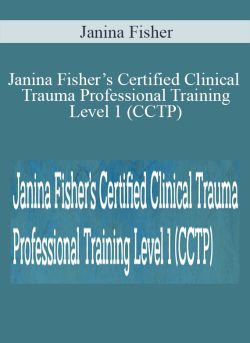 Janina Fisher – Janina Fisher’s Certified Clinical Trauma Professional Training Level 1 (CCTP): Working with the Neurobiological Legacy of Trauma
₹12,284.00
Janina Fisher – Janina Fisher’s Certified Clinical Trauma Professional Training Level 1 (CCTP): Working with the Neurobiological Legacy of Trauma
₹12,284.00
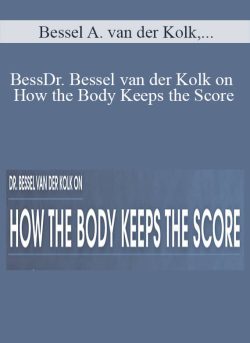 Bessel A. van der Kolk, Martin H. Teicher, Cathy Malchiodi, and more! – Dr. Bessel van der Kolk on How the Body Keeps the Score
₹9,794.00
Bessel A. van der Kolk, Martin H. Teicher, Cathy Malchiodi, and more! – Dr. Bessel van der Kolk on How the Body Keeps the Score
₹9,794.00
Linda Curran, Frank Anderson, Edna Foa, and more! – Treating Complex Trauma: Beyond Competency
₹9,794.00

